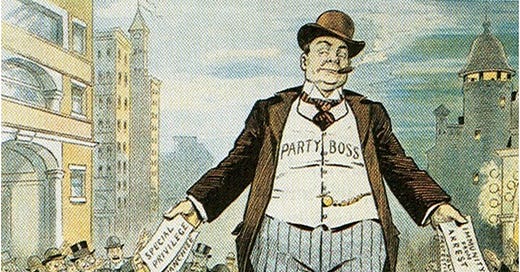Over at the Volokh Conspiracy, guest blogger David Schleicher tries to explain why so many cities are, like Singapore, one-party democracies. He begins by pointing out that the “obvious” explanation is wrong:
It is true that in almost all major American cities, one party is dominant. However, as I argue here, this, it turns out, can’t explain the lack of competition either, at least on its own. In order for national political preferences to explain the lack of competition at the local level, we would need a reason why the party that is in the minority locally doesn’t change its stripes – at the local level – to become more attractive. That’s what Downs would predict, yet it doesn’t happen at the local level.
I eagerly await David’s solution. But the best explanation I’ve come up with so far is that voters have party preferences as well as policy preferences. As Lindbeck and Weibull assume in a model that I used in my dissertation, voters might strictly prefer e.g. Democrats to Republicans even if their platforms are identical. Here’s how I explain the assumption:
Lindbeck and Weibull (1987) suggest that it captures parties’ contrasting and relatively fixed commitments to important non-economic policies, such as their stances on abortion and national defense… Alternately, in line with much of the empirical political science literature on party affiliation (e.g. Mutz and Mondak 1997; Sears et al 1980; Luttbeg and Martinez 1990), [party preference] could irreducibly reflect individuals’ inherited partisan loyalties. Just as many sports fans root for “their” team even though all teams have the same objective function, many voters strictly prefer “their” party even if it acts the same as its competitor. For example, Catholic voters might continue voting for traditionally-preferred Democratic candidates even though platform changes leave them somewhat ideologically closer to Republicans.
Who cares? Well, when voters have party preferences, the intrinsically more popular party has slack which enables it to (a) consistently win, (b) deviate from voter preferences, or (c) both. That definitely sounds like Singapore. Could it just as easily be New York or San Francisco?
The post appeared first on Econlib.





There might be real benefits, not just perceived benefits, to sticking to one party. If an incumbent has been mayor for a decade, and there's a challenger with policies that slightly more closely match your own, you might still prefer the incumbent. Because the incumbent has experience governing and wouldn't need to waste time learning the job or building relationships with the other major players in the city, meaning they can get the same goals accomplished faster than a rival with an identical platform.
Also in a city a party might really be a patronage network.